John Wilson: back at Abbey Road in May 2003
David Ades reports on two memorable Vocalion sessions
Studio 2 at EMI’s Abbey Road studios in North London is probably the most famous recording studio in the world, thanks to its association with The Beatles. But it was producing hit records long before that, and it also gave its name to the much respected Studio Two Stereo series on EMI’s Columbia label which was launched in the mid-1960s.
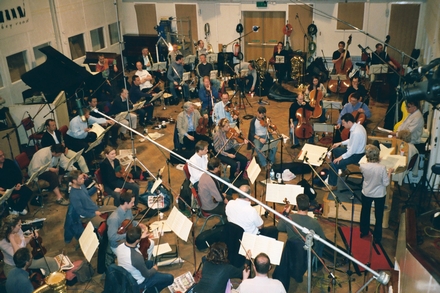
Although smaller than the famous Studio 1, it is nevertheless very suitable for concert orchestras, including the 50 musicians (many from the leading London symphony orchestras) assembled on Tuesday 13 May for the first of the Angela Morley recordings.
During the morning session (11.00am – 2.00pm) John Wilson conducted some of Angela’s scores for the films "The Slipper and the Rose", "Watership Down" (with John Harle taking the saxophone solo in Kehaar’s Theme) and "Captain Nemo and the Underwater City".
Angela herself had travelled over from her home in Scottsdale, Arizona, to supervise and assist as necessary, and it was clear that John greatly appreciated her involvement and great enthusiasm for the project. Sometimes she would be standing at John’s left hand while he rehearsed his fine orchestra (led by Andrew Haveron), and on other occasions she would be sitting alongside Michael Dutton in the control room listening intently to the magic sounds being captured on tape (large reels, 2 inches wide, costing £2 per minute!). Also on hand was Michael Ponder, keeping a watchful eye on the scores, and making copious notes to assist with the mixing and editing, which would be undertaken over the following weekend.
The afternoon session from 3.00–6.00pm (with the same symphony size orchestra) began with Angela’s superb "A Canadian in Mayfair", which she composed as a tribute to Robert Farnon, virtually launching her international career as one of the finest light music and film composers of the last century. The original manuscript had been lost (probably in that disastrous fire in 1964 at Chappell’s Bond Street premises), so Angela had painstakingly reconstructed her score by listening to the original recording. Like all great artists, when offered the opportunity to revisit earlier work, she could not resist the temptation to make some subtle changes here and there, which will provide added interest for her many admirers. They will be reassured to know that she has retained all the vibrancy and sheer ebullience of this light music classic.
The film music from "When Eight Bells Toll" was followed by another work for the Chappell library – "Snow Ride". This is the first time it has been recorded commercially, and it is a bight, bouncy number that perfectly captures the festive season. Through the Woods from "Watership Down" was soon ‘in the can’, to be followed by more film music – from "The Looking Glass War". This dates from 1969, which was a busy period when Angela decided to concentrate more on writing for the big screen, and film producers were more than happy to employ her talents.
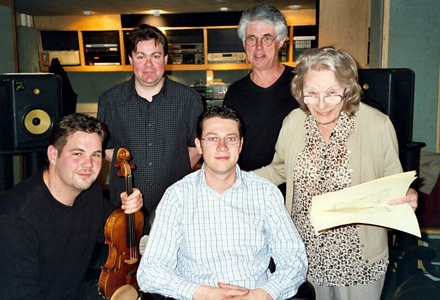
After she settled in California, the local TV studios soon realised that they had a major film composer in their midst. Unfortunately television music seems to have a very short shelf life, and it can often pass unrecognised. Happily this new CD allows us to hear excerpts from several of Angela’s television scores, and White Wing (from "Hotel") is an indication of how much good music may be slipping away.
This very productive session continued with "Rotten Row", which very nearly didn’t get recorded. It was around 5.00pm when John Wilson suddenly realised that the scores weren’t where they should have been. This Chappell composition (probably Angela’s best-known work) is happily still available on hire, and the company responsible had sent it by special delivery the previous day. Unfortunately, the Post Office had failed to deliver to the Abbey Road studios on time, so frantic telephone calls were made to try and retrieve the situation. It would have been a tragedy if this charming work had been omitted from the CD, but it had to be recorded that afternoon, because the smaller orchestra on the following day would not comprise of the right mix of musicians. To cut a long story short, the manuscript was faxed to the Abbey Road studios in 30 parts, which were then hastily photocopied by the writer of this article, and eventually distributed to the waiting musicians. There was little time for rehearsal, but London musicians are renowned for their sight-reading, and "Rotten Row" posed no problems. In fact John Wilson took it at a gallop, rather than the usual gentle canter, so listeners will find it interesting to compare with other recorded versions. Angela appeared a little shocked at first, but she soon seemed to approve of the new interpretation! Somewhat amazingly, there was still a little time left, during which "My Autumn Love" was successfully recorded.
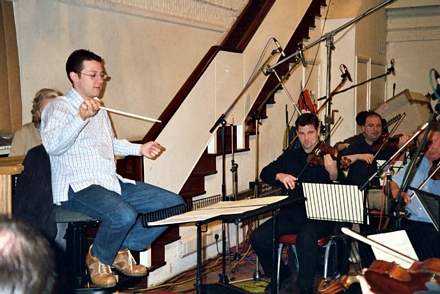
The final three-hour session began at 10.00 the following morning, with a smaller orchestra – mainly strings and woodwinds. The first two numbers had television origins: firstly "Madame X", then (from that memorable series "Dynasty") Angela’s haunting Blues for Alexis vividly conjuring up mental images of Joan Collins. Missing parts again posed problems, so the tea break was taken at this point, allowing Angela to write some extra phrases for cor anglais and clarinet in the next number, Venturing Forth from "Watership Down". This left just one final number – the delicious "A Tender Mood" which many radio listeners will recall from the 1980s when Angela was often invited as guest conductor of the sorely-missed BBC Radio Orchestra.
The following afternoon Angela and John supervised some overdubbing on two numbers. Guitar and bass clarinet were added to "The Looking Glass War" and guitar was dubbed into "My Autumn Love". Then Tony Fisher arrived with his flugelhorn to add solos to both numbers, thus completing the magical sessions for this new CD.
Angela Morley seemed very happy with the way in which everything had gone, and she was clearly looking forward to mixing the results at the weekend. Her enthusiasm is an example to us all, and her energy is phenomenal; after the sessions she was planning extensive tours of England and Europe, before eventually returning home to the USA around seven weeks later at the beginning of July. Her only acknowledgement of the passing years was her confessed revulsion at the thought that she will celebrate her 80th birthday on 10 March in 2004. It will simply be yet another milestone that she will take in her stride, and we look forward to her future visits to record more of her wonderful music for posterity.
Paul Weston charts
As soon as John Wilson had packed away the final Angela Morley scores at 1.00pm on Wednesday 14 May, he had to turn his attention to the afternoon’s session, recreating some of the marvellous scores penned by Paul Weston – many over 50 years ago. During the 2-hour break the studio was rearranged to accommodate an 18-piece big band, with 4 trumpets, 4 trombones, 6 saxes plus piano (Andy Vinter, ex-BBC Big Band), double bass, drums and guitar.
At 3.00pm promptly, the first run-through of Just You, Just Me began, with John beaming all over his face in response to the great sound – often just sitting on his chair without conducting, leaving the band to take control of the melody. Thereafter one standard followed another as the band got to grips with Talk of the Town, At Sundown, Judy, I’m Confessing and finally Memories of You with an outstanding trumpet solo from Mike Lovatt.
It was good to meet up with Paul Weston’s son Tim (accompanied by his charming wife Shelby), who had come to London especially for these sessions. He seemed very impressed with the band, and with the wall of sound that engulfed us in the control room. Tim wasn’t even a glint in his parents’ eyes when some of these charts were written (his mother is, of course, the legendary Jo Stafford), but he could remember seeing his father working at home on scores, sitting at the piano with a pencil in his mouth. At the time the family was living in Beverly Hills, where they had moved in 1957, and like all busy musicians, Paul was frequently facing deadlines. In the days before faxes and photocopying this meant rushing scores by car to his copyists (Clyde Balsley and Jack Collins) in Hollywood. In 1980 the Westons sold their home and settled in Century City, a suburb of Los Angeles.
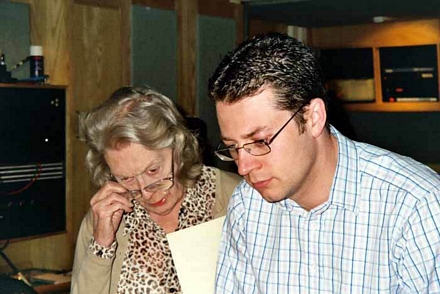
On the podium Paul could be a hard taskmaster, expecting high standards from his musicians. He would clap his hands when it was necessary to bring them to order. Away from work he was quite different – relaxed and good company. When constructing his scores he would always take special care with his introductions, and the links between the reprise of the main theme. Occasionally it is possible to detect a pattern in his arrangements for full orchestra, with the theme first being given to the strings and woodwinds, before the brass are allowed to grab the melody firmly and fully, creating a blast of sound that must have caused some problems for early sound engineers.
The next morning at 10.00am the band was augmented with vibes, for six more great numbers – Breezing Along With The Breeze, It’s a Lovely Day Today, You Turned The Tables On Me, Keeping Out Of Mischief, What Can I Say and All Of Me.
As already mentioned, during the afternoon some Angela Morley tracks were over-dubbed, so the remaining two Paul Weston sessions were scheduled for Friday the 16th, commencing at 10.00am when 22 strings plus harp were added. The trumpets and trombones were reduced to three each, but there was still a strong sax contingent of six players, doubling on various other instruments as usual. Radio-2’s Malcolm Laycock also made a welcome appearance, and in the afternoon singer Gary Williams (fresh from his triumph at the Royal Festival Hall film music concert in March) called to see his friend John Wilson.
The opening number Moonlight Becomes You had everyone in the control room gasping with delight when the full brass section opened up half-way through. The same glorious effects were soon repeated in other numbers, including Time After Time, East Of The Sun, Time On My Hands, You Go To My Head and This Can’t Be Love.
The string sound coming from the John Wilson Orchestra was noticeably fuller than used to be heard on Paul Weston’s own recordings. Was he restricted by his record company bosses, or did he decide for himself that a massive string section was not required? Maybe the microphones and/or studios in the USA produced a different sound? Tim Weston discussed this with his mother upon his return home; Jo Stafford said that the small string section reflected the fact that Paul himself was paying for the sessions! Jo was one of the few artists who, by virtue of her big sales, could specify/’command’ that the company ‘ate’ the costs of recording.
Paul’s own instrument was the piano, although his particular favourites were saxes and clarinets. As a very young man he had decided to study arranging after an horrific train accident had almost killed him, because he had to find something to occupy him whilst undergoing a long convalescence. It proved to be the turning point in his career, especially as he had previously failed an audition to join a dance band as a clarinet player. (Later he joined the same band on piano – The Green Serenaders at Dartmouth – and toured South America and the Caribbean playing with them on a cruise ship).
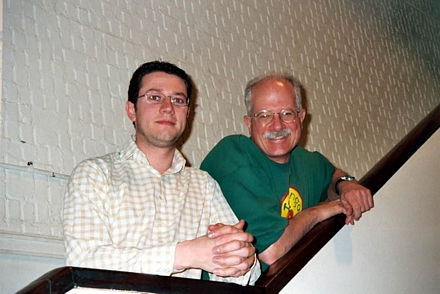
After an hour’s break for lunch, the final three-hour session began at 2.00pm, with another run-though of This Can’t Be Love, hoping to improve on the pre-lunch play-through. The usual pattern is for each number to be rehearsed once, then a ‘take’ is recorded. Sometimes this is very good with very few ‘fluffs’ or wrong notes, but either the conductor or the sound engineer usually spot something that is not quite right. A second ‘take’ is often sufficient, and if necessary parts of the two can be edited to make one satisfactory performance. Sometimes a short passage is repeated (a ‘patch’) which can easily be inserted, which avoids too much time being spent re-recording something that has been satisfactorily achieved previously. Very rarely a certain number might keep causing problems, requiring even four or five ‘takes’ but by this time the musicians are starting to get a bit jaded, and the performance can begin to suffer.
Things went well during the afternoon, with Sleepy Time Gal, When Your Lover Has Gone, Through, But Not For Me, Poor Butterfly and April In Paris successfully taped. Time was available just before 5.00pm, so it was decided to do a re-take of Time On My Hands which had not entirely pleased John during the morning.
And then it was all over. Everyone was still on a high, reliving some of the highlights of the past four days. New friends had been made, and old friends warmly greeted once more. RFS members Stan and Pat Coates had been at John’s side in the studio, checking through all the scores and collecting and distributing them at each change of title.
It takes so many people to bring an enterprise such as this to a successful conclusion, and one can only hope that the wonderful sounds heard in the studio can be faithfully recreated at home when these two CDs are eventually released. In the safe hands of Michael Dutton, this is a guaranteed certainty!
David Ades (August 2003)
For details of these – and all Vocalion CDs – you are invited to visit their website which you can access through our ‘Links’ page.


